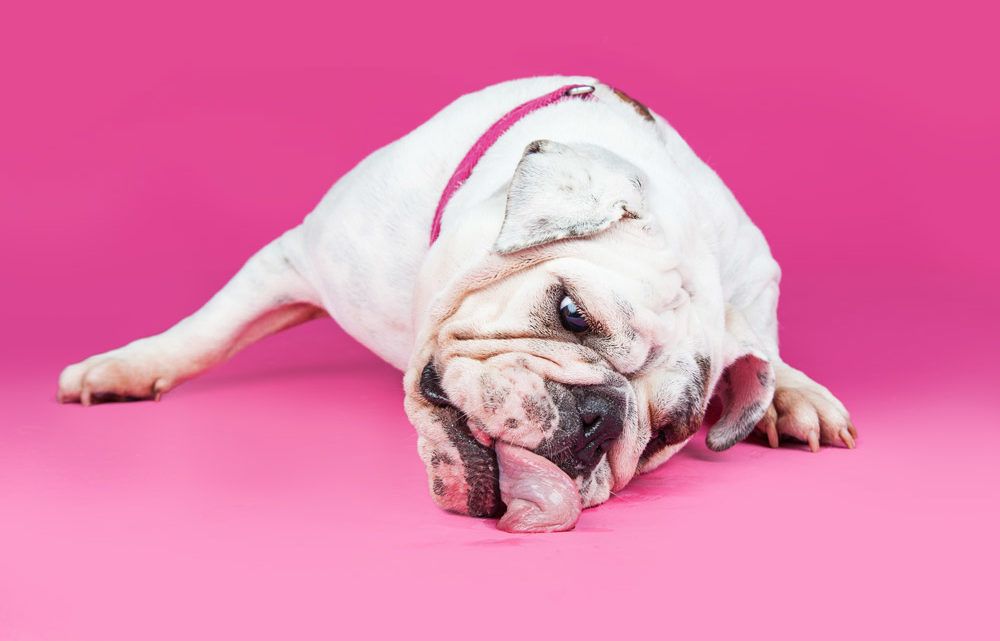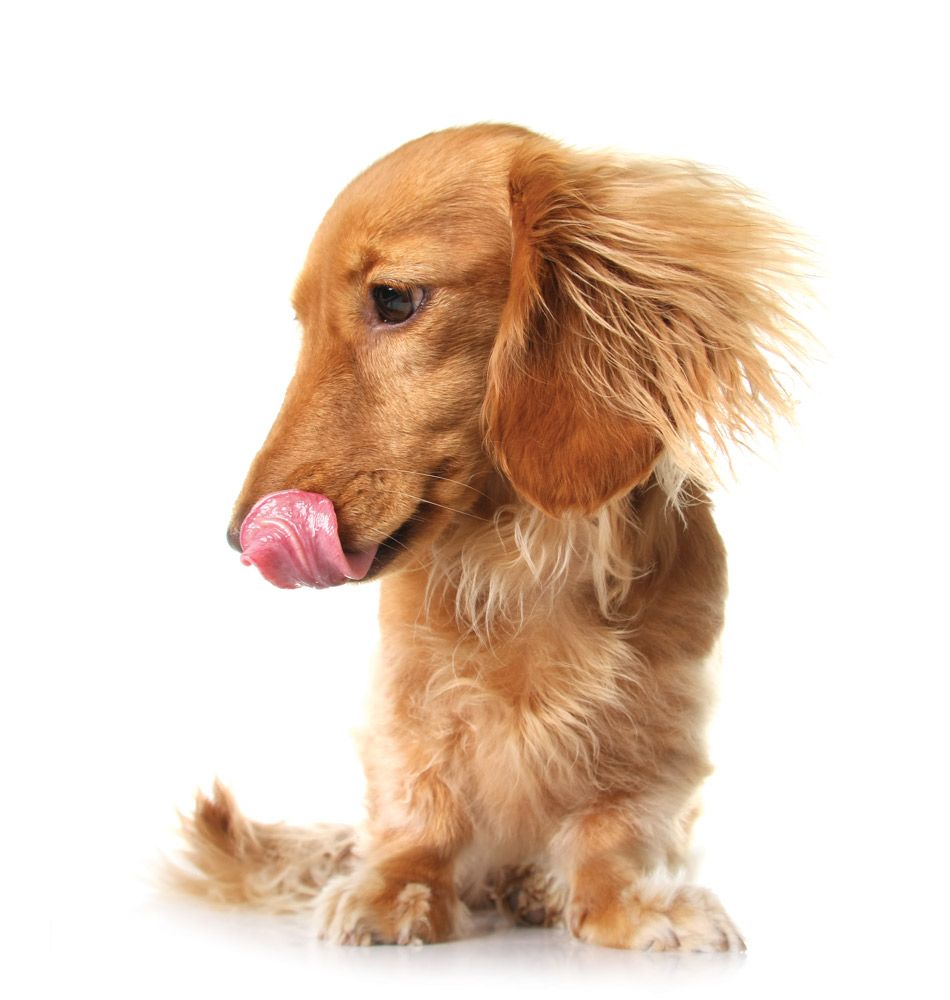strykerdobe
Hot Topics Subscriber

by Karen Shaw Becker, DVM

A recent study has shown that ELS (excessive licking of surfaces) is a telltale sign of gut disease in dogs.
If your dog seems obsessed with licking objects around the house, he might have a condition called “excessive licking of surfaces” or ELS. Dogs with this condition relentlessly and repetitively lick floors, carpets, walls, furniture, their owner’s legs, hands or arms, and even their own lips. It’s important to distinguish ELS from self-licking, which is usually caused by itchy, irritated or inflamed skin, hot spots, and/or acral lick dermatitis.
Excessive licking behavior may seem harmless, so many dog guardians just try to ignore it. However, if your dog swallows enough hair or fibers from the objects he’s licking, it could potentially result in a serious intestinal blockage requiring surgery. Some people ask their veterinarians about ELS behavior, and are often told it is an obsessive-compulsive disorder. However, holistic vets have known for years that animals who “air lick” or obsessively lick floors, sofas, carpets, etc. almost always have GI issues. Many GI problems cause nausea, and dogs can reduce this unpleasant sensation through licking behavior.
A recent Canadian study showed that ELS is indeed very often health-related rather than behavioral, and that almost 75% of dogs with ELS had some form of gastrointestinal disease!
Study links ELS to GI problems
The study was conducted by researchers at the University of Montreal Veterinary Teaching Hospital and involved 19 dogs with ELS, 16 of which engaged in the behavior on a daily basis. Ten healthy dogs were also involved as controls.
The dogs received behavioral, physical and neurological examinations, followed by a thorough digestive system evaluation that included lab work, ultrasound, endoscopy, and histopathologic analysis of GI tissue samples.
The results showed that 14 of the 19 dogs with ELS (74%) had GI disease. Identified disorders included:
- Eosinophilic and/or lymphoplasmacytic infiltration of the GI tract
- Delayed gastric emptying
- Irritable bowel syndrome
- Chronic pancreatitis
- Gastric foreign body
- Giardiasis
The researchers further observed that the ELS dogs were not significantly more anxious than the control dogs. They also noted that seven dogs in the study engaged in ELS behavior at home after eating their meals – the researchers suggested this might indicate nausea or discomfort triggered by eating.
The study concluded that GI disorders should be considered in dogs who display ELS behavior. Hopefully, these findings will motivate more conventional veterinarians to evaluate dogs with ELS for potential GI conditions, rather than attributing it to behavior problems.
Study treatments were conventional

While the findings of this study are certainly important, the treatments administered to the ELS dogs were limited to drugs and commercial processed diets. The treatments were based on the dogs’ diagnostic test results and symptoms, and included:
- Fenbendazole, a broad-spectrum anti-parasitic drug used to treat giardia infections
- Commercial (processed) elimination diets
- Prednisone (a corticosteroid), sometimes coupled with cyclosporine (an immunosuppressant) for dogs with eosinophilic and/or lymphoplasmacytic infiltration of the GI tract (e.g., lymphoma)
- Prokinetic drugs to enhance GI motility, coupled with canned food for dogs with delayed gastric emptying
- Sulfasalazine, an anti-inflammatory drug, coupled with soluble fiber for dogs with irritable bowel syndrome
- Manual removal of a gastric foreign body (a 12” nylon rope) in one dog
- Five ELS dogs with no diagnosed GI abnormalities received elimination diets, antacids, and in some cases, anti-nausea drugs.
When I treat a dog with GI disease, I always try to resolve the problem without resorting to the use of drugs. An exception might be in the case of an established, identified infection (e.g. giardiasis) that requires anti-parasitics or antibiotics because the infection was not responsive to natural alternatives.
In my experience, overuse of antibiotics and corticosteroids like prednisone in veterinary medicine is the root cause of many of the GI issues we see in pets today. Their use should be strictly limited to situations in which no safer option is available or has proved effective.
Unfortunately, many conventional vets continue to automatically prescribe these medications to treat disorders of the digestive tract; even worse, they often leave patients on these drugs for weeks, months or years, making long-term side effects almost inevitable.
Alternative recommendations
When dealing with GI disorders, whether related to ELS or not, I opt for customized anti-inflammatory diets of fresh, whole, organic, and non-GMO foods. Each diet must be tailored to the individual animal’s specific GI disorder(s) and symptoms. Working with a nutritionist allows you to create the perfect diet for your pet.
Many people don’t realize that healing modalities such as acupuncture and chiropractic can also be very helpful in treating GI disorders. For example, holistic veterinarians are aware that many dogs with excessive licking behavior have hiatal hernias that can be managed with chiropractic care. In fact, a veterinary chiropractor I know gets dozens of referrals to treat ELS dogs diagnosed with hiatal hernias! H
Homeopathic and TCM protocols (chosen on the unique history of each patient), in addition to nutraceuticals (and dietary intervention), can also provide good long-term solutions to this strange syndrome.
If you’re concerned your dog may have ELS and/or a GI condition, make an appointment with an integrative/holistic veterinarian for a checkup, including all appropriate diagnostic tests and a thorough GI evaluation. Once you’ve ruled a GI disorder either in or out, you can decide on the best approach to treating your dog’s situation.
Is your dog always licking things?

 We ended up feeding him some kibble the next day which resulted in
We ended up feeding him some kibble the next day which resulted in 





 He's now 17 months.
He's now 17 months.
 He's such a food monster!
He's such a food monster!

